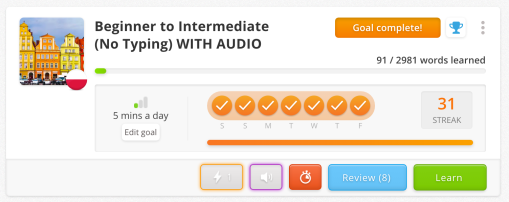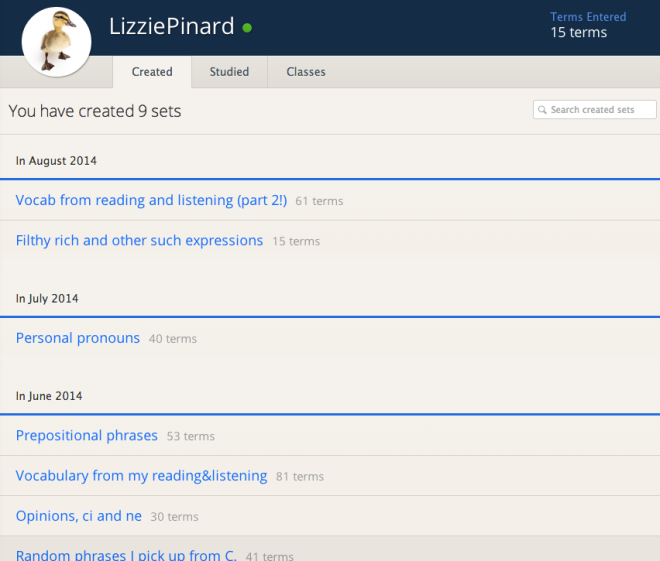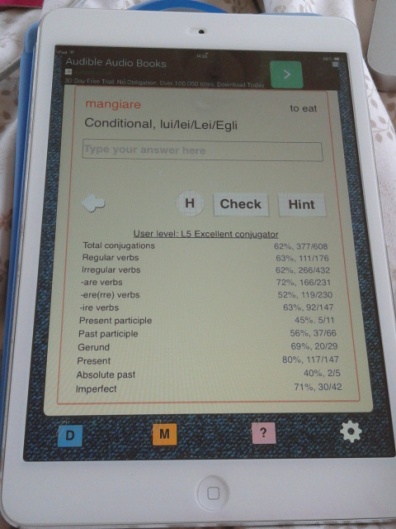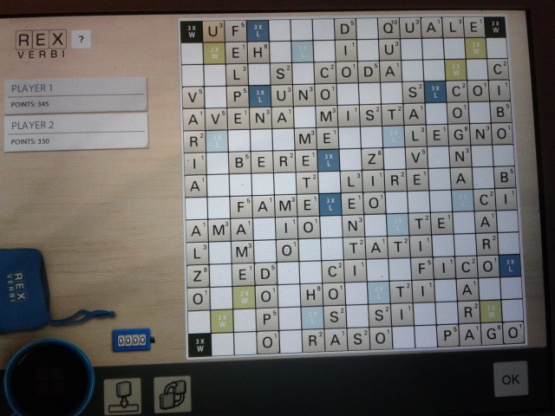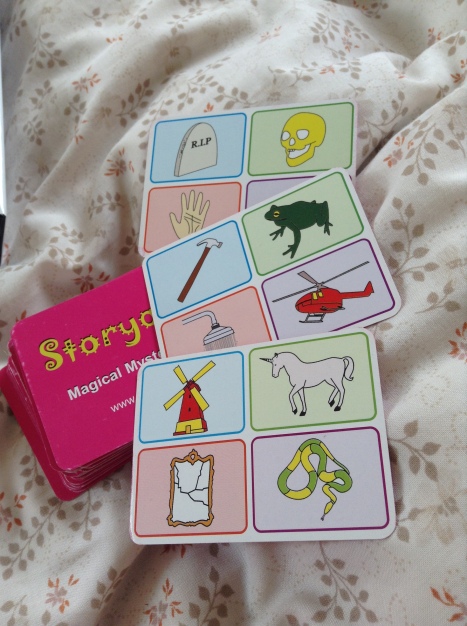Diary of an intermediate language learner continues with…
PART 2
(You can also read Part 1 here )
Day 2 – Tuesday 24th February 2015
Today we started by recounting in pairs what we had done since yesterday’s lesson. This time, we had to do it by drawing and guessing. It was great fun, but took ages and I felt I wanted to TALK rather than draw and guess. However, for those who have been in the class for a while and have already had plenty of speaking opportunities, this is a great way of adding some variety. I wonder how we’ll do it tomorrow? I must say, I felt rather envious of my partner who had spent his afternoon visiting a monument, buying theatre tickets for tomorrow, going dancing, and other students who had gone home, changed into gym clothes and been to the gym, then done their homework. I, meanwhile, had left Italian class, swallowed lunch, taught 2 classes, did All The Things, including homework, in my ‘break’, then taught two more classes before dragging myself home to a cup of tea and bed! I think the perfect combination would be a language learning and horse-riding holiday. Learn in the morning, ride in the afternoon, or vice versa, and some days with just horse-riding too. Bliss! 😉
Next up was homework checking. This took a long time, but was very useful. I suppose in a 3hr class you have much more time to play with than a 1hr20 minute class (the usual length of the classes I currently teach). Checking the homework involved teamwork/points for correct answers, which was fun except for the point where I had been nominated by my group to read out our answer, but it was the last one in the section and for the final gap I had apparently misheard the final decision, in the scramble to wrap up, so I made a mistake and lost the point for our team le stelline. I crettini got it instead, and one member of my group had a right go at me! That was rather upsetting and threw me temporarily but then I got over it.
Once we had finished checking homework (I was chuffed that I had done it all!), we returned to the stories we had written yesterday. C had looked at them all and marked up the errors using a correction code. They were stuck up around the classroom and we had to go round and try to correct the errors she had highlighted. This was a really lovely activity (another one I plan to steal! There’s an IELTS group-essay writing activity that I think this would make the perfect follow-up to…) but I found that I was very focused on the errors and didn’t really pay much attention to the story itself. So much had happened since we wrote them (work, life, homework, a lot of homework correcting!) that I could barely remember the premise. So, I think it might have been nice to have had a quick look at the stories right after we had written them yesterday, in order to enjoy the nonsensicality and humour, and do all the meaning processing, to then return today for the error correction activity.
The remainder of the lesson, following the break, was focusing on pronouns. We had a list of 14 sentences with errors in, which we had to correct in teams. This I found a bit frustrating because in my group of 4, two students hadn’t studied pronouns at all before, one a little bit and me not masses but definitely more. I wanted to be in the other group. :-p Frustrating, though, not because I was impatient with my classmates but because I found it difficult to explain in Italian what I understood. (Lack of language classroom experience – not used to discussing language in the TL – as anticipated on Day 0!) And so my poor group mates were doubly challenged, by their lack of prior knowledge and my rubbish Italian! For example, how the formal ‘Lei’ works. Fortunately, for this one, C stepped in and explained nicely and clearly! She also gave the two who had no prior some scaffolding (a table of subjects and pronouns – direct and indirect). So I experienced as a student the value of good monitoring and responding to situations that arise (obviously this kind of situation is not unusual in mixed-level classes). Whole class feedback took the form of a point scoring game. It was funny because there was this two-tier point-scoring system and everything carefully written up on the board but then at the end, after all that, we didn’t add up the points! Not that it mattered.
(Interestingly for me, from a classroom management perspective, in terms of group work, I sometimes found groups of 4 unwieldily big for discussing, but also discovered what a difference moving furniture makes. Obviously I “knew” before, and one always does encourage learners to move into a tighter grouping prior to discussion, but I didn’t appreciate what a difference it makes until experiencing as a learner first-hand, the contrast between starting spread out and then continuing after C had duly pushed us into a tighter grouping.)

Teamwork! (The ticks refer to which ones have been done – the game meant we went through them in random order – rather than what we got right or what was right to start with…)
Finally, homework was of course set. So much to do, so little time. Thank goodness a) the writing homework (writing a correct version of one of the marked up stories we’d looked at earlier) is not due for tomorrow and b) I hopefully will finish at 7.20 tomorrow, meaning I’ll have time to do written homework. Meanwhile, All The Things (preparation, marking, tussling with cantankerous photocopiers, eating, gap-fill homework due tomorrow) must be done between 4.30 and 6. Am utterly exhausted. But can’t believe 50% of the course is already gone. Must. Make. Most. Of. Rest.
Overall, today’s lesson was fun but seemed very grammar-heavy. The individual activities were all engaging and useful, but felt a bit disconnected one from the next. Unlike yesterday, there was no context, no text, no situation. And all the speaking we did was about language. I think maybe having spent as long as we did on homework correction, I perhaps wouldn’t have then gone into the story correction activity at that point (though such a nice activity) because it constituted more correcting, albeit of a different sort. Whereas possibly a complete change of focus, keeping the story correction for a later stage, might have been good. So, for example maybe instead of the correction activity, working with a text, or having a discussion, and introducing some kind of context for the pronouns work.
Am slightly sad that this week’s focus is pronouns, as it would have been interesting to study something I haven’t studied before, to feel what it’s like to learn something from scratch in a group. However, I’m crap at pronouns so it’s no bad thing linguistically! 🙂 I hope tomorrow there will be more speaking, listening or reading and fewer grammar activities.
On reflection, I think that C tends to favour a test-teach-test lesson frame (which is cool – start from what we learners know and build on it) and perhaps where we finished with the pronoun game, that was a ‘test’ element, with feedback providing some ‘teach’ but perhaps running out of time was the reason for the lack of text or context introduced in this lesson – it might have been next on the list? Nevertheless, I think it would be nice if the ‘teach’ bit wasn’t necessarily board-based explanation. C’s explanations are very clear, supported by equally clear board work, which is very helpful (I really wish my explanations and board work were as good!), but, pain in the butt that I am, both linguistically and pedagogically I’m also interested in experiencing a guided discovery activity as a learner, whereby the group-work would encourage us to investigate and work linguistic things out, with some kind of scaffolding questions, rather than just test us (as, for example, the pronouns game did). This way, sometimes the board-based explanation could fill in the gaps that remain rather than be the dominant mode, adding extra variety and catering for different learning preferences. The structure of the course (long [3hr] daily lessons) might also lend itself to a task-based learning lesson frame and/or some kind of project work. Which I’d also like to experience! Not that I am at all demanding… 😉
Meanwhile, today has set me thinking about the importance of lesson shape, flow and providing opportunities for speaking not only about language: a trigger for closer scrutiny of my own teaching… I have also realised that I have been applying some of what I learnt on the tutor training course: particularly that relating to lesson observation. While, of course, I am a participant rather than an observer, so in some ways it is flawed as an observation, in others it makes the process even more powerful as an experience, because you actually feel the effect of what is being done rather than just observing it. So that’s another layer of learning for me: language learner, teacher AND tutor-in-training!
Day 3 – Wednesday 25th February 2015
Today, again, I was in bright and early, ready to start. This time, however, I plucked up the courage to chat with partner in Italian while waiting for others to arrive! 🙂
This time, we didn’t discuss yesterday’s events straight away. Instead, we all had to write our favourite word (learnt so far on this course) on a piece of paper. I chose ‘ingannare‘ – make someone believe something that isn’t true. Then C gave us all someone else’s piece of paper, and we had to tell our partner what we had done yesterday since the lesson, with the challenge of slipping in the word/chunk on our new piece of paper. Partner, of course, to guess what the word/chunk is. (Another activity I fully plan to steal! Edit: Tried it with my Level 3’s, another win! Note to self: Adapt it for use with my EAP students over the summer…) I had “fa venire i brividi” and spoke about my photocopiers woes – it was the passage of time (wasted) vs the need to do All The Things (of which there were many), and the rising of panic in direct proportion to said waste time, that mi faceva venire i brividi. Within the process of playing this game, a nice expression emerged related to the word I had written down initially: “ingannare il tempo” – in English, ‘kill time‘; as C said, Italians are less brutal and just dupe it/beguile it instead. 🙂
Then, it was homework checking time. This time, no games. For me, a relief after yesterday’s episode! (Though the girl in question was absent today anyway!) It didn’t take quite as long as yesterday. Again, though, it was useful. Inevitably, from time to time, in the process of these discussions, we lapsed from Italian into English. I like how C deals with this: She would say something along the lines of “That doesn’t sound like Italian to me…maybe it’s some kind of strange Sardinian dialect. I don’t speak Sardinian so I don’t know.” – essentially, drawing attention to the issue (being that we needed to be speaking in Italian not English) but in a humorous way, thereby achieving the goal (we’d switch back to Italian) without it becoming a “thou shalt…” mandate and keeping a pleasant, fun atmosphere in the classroom. This is another technique I want to adopt. On a side note, it’s been interesting to experience the question of rapport from the learner seat, and how nice it is when the atmosphere is comfortable, when there is a lot of humour and banter both between students and between the teacher and students. It definitely does oil the wheels of the learning process!

Review emerging from homework
Next, joy, we got a context! Enter Walter and Natalia. Fortunately, one of my classmates requested for the clearer black pen to be used at this point. Which reminds me, I really need to get some more pens from the office – my only remaining pens are red and green, which isn’t great if any of my students are red-green colour-blind. Plus, green isn’t much better than fading blue, visibility-wise, as a main colour! Better for marking up/highlighting things. (Edit: Now fully armed with new pens and am paying much more attention to my board-work! And generally writing more things on my board, having found it very helpful when C wrote emergent vocabulary up on the board, which she always made a point of doing.)

Meet Walter and Natalia!
C elicited adjectives to describe this married couple who have a little girl, by telling us how they behave. Next we did a vocabulary matching activity, during the feedback of which lots of extra language emerged and was dealt with. C is very good at responding to emergent language and random questions in a way which I find is really, really motivating from a learner’s perspective. I wonder how I compare in that way. Another thing to put under scrutiny in my next classes! I also noticed that she does concept checking/display questions really well. (Jealous!) She puts on a sort of ingenuous air that makes it all rather humorous. As a learner, I find the question process reassuring – that I have understood correctly. So I think I’d also like to adopt/steal this approach to concept questions, as I might then feel less awkward than I have been known to feel when doing this type of checking and therefore ask more of these questions! [Edit: I duly tried it in my first class after this lesson and it worked a treat! Something else to play with more…]
Next, we got a jumbled up conversation. Clear instructions and instruction checking questions ensured that we didn’t write anything in the gaps, we didn’t reorder the conversation, we just picked out which lines were Natalia’s and which were Walter’s. Once that was done, we were able to reorder the conversation and then practice it together, putting appropriate pronouns in the gaps. This was followed by whole class feedback, in which we were nominated in turn to read out the line, inserting the relevant pronoun. That brought us to break-time.
After break, we got a handout with the gapped dialogue in order, and went through it AGAIN line by line, nominated, inserting the correct pronoun. I found this a little tedious and would have preferred to have had the handout when we went through it the first time round. However, more questions did come out the second time round, so therefore for those with less experience of pronouns, this was valuable. E.g. who is the subject, what is the object, what is the pronoun substituting, how does word order affect meaning etc. (I wonder if all my reading has helped me get over these word order issues? Or possibly because French also has special word order with pronouns so as a concept it is familiar to me…Still, whatever the case, it’s still way more interesting than the alphabet was! 😉 ) I think after this extensive language focus, it would also have been nice to try and ‘perform’ the dialogue without looking at it. This would have required some improvisation but should have been doable as by this point we were very familiar with Walter and Natalia and the meaning-content of the dialogue. We could have then been given some delayed feedback on our use of pronouns in the process of our improvisations.
In the event, we abandoned Walter and Natalia rather abruptly, and appeared to abandon pronouns, to move on to a guessing game where C gave out clues on cut up pieces of paper, one at a time, to different individuals to read out to the rest of the class, the aim of which was to have us guess what traditional dish she had written a recipe for. It was fun and a lovely way to bring some culture into the lesson. But I was also quite tired by this point and confused about what this had to do with all else in the lesson up to this point, which had revolved around Walter and Natalia, as well as pronouns. They – and their child – had now disappeared from the scene! Eventually, after we had guessed what the recipe was, and done a vocabulary matching activity (during which again lots of interesting language emerged and many random questions were dealt with! 🙂 ), we were given the recipe, which, it transpired, had been written without pronouns! Aha! All became clear: the missing link. And so it was that our homework task was to rewrite the recipe WITH pronouns. C gave us a bit of input on imperatives (which she elicited as commonly used in recipes) and pronouns first, to set us up for this. (Note to self: steal this recipe-guessing activity to adapt for Level 2 to review quantifiers…and then see which other levels I can shoe-horn it into as well!)
And that brought us to the end of the lesson and the end of day three. The recipe was a lovely personal touch, but I wonder if there would be a way to make it flow more smoothly from what had come before. I haven’t yet had time to think enough about this to come up with a ‘solution’ (‘..’ because it’s not a ‘problem’ as such, just a point of interest to me! And, again, is just making me ponder lesson shapes, flow, staging, explicitness of connections between activities and so on. All of which is useful to think about!)
All in all, I enjoyed today’s lesson and was relieved when use of context came into play. I think chopping up the dialogue was a great way to introduce it and get us to process it for meaning before working on the pronouns. And the clear instructions were important to make sure we didn’t screw up the staging by focusing on the gaps too early. Must remember this! One thing that I do notice is that it is the end of Day 3 and I still know very little about my classmates. I would really like there to be some kind of opinion exchange speaking activity, where I could find out what they think about stuff and have a go at expressing my own opinions on stuff. I think I mean speaking activities that allow some personalised use of all language resources, not just target structures or discussion thereof. This has made me pay particular attention in my lessons today subsequent to this class, to what opportunities I provide for interaction of this nature. In the form of lead-ins, response to texts and so on. I also wonder if we will do some reading tomorrow, as we haven’t yet.
I think so far my favourite day has been day one, with today in second and yesterday in third place. But don’t get me wrong: I have thoroughly enjoyed being in the classroom every day, particularly the way that it has, without fail, enabled to me to shut the outside world out temporarily, it’s really nice to engage that intensively with something.
Teacher Take-away
Here is my subjective summary of what Days 2 and 3 taught me:
- it is difficult to focus on errors and meaning at the same time (cf. the story-writing correction activity).
- activities can be really good individually but lack flow as a series.
- sometimes the link between activities can be immediately obvious to teacher but not to the learners.
- context is very important for flow/lesson shape and having a context makes everything a lot more fun and meaningful.
- talking only about language isn’t enough.
- related to above point, if talking opportunities are mostly language-related, you don’t get to know your classmates.
- discussing language in the target language is actually quite difficult if you aren’t used to it! If one person in a group isn’t used to it, it can make things more difficult for the other group members too.
- effective monitoring and classroom management is so helpful. 🙂
- it’s really nice when the teacher personalises the materials.
- concept checking can be reassuring as a learner, and there are ways of making it fun as a teacher.
- responding well to emergent language is very motivating for learners.
- non-gap fill homework makes a nice change! But is much more time-consuming, which is difficult when you have a heavy schedule. Conclusion: when giving more time-consuming homework, give a longer deadline (as C did).
- Decent board pens make a big difference to clarity of board work!
- Clear board work is lovely to be on the receiving end of!
End of Part 2



